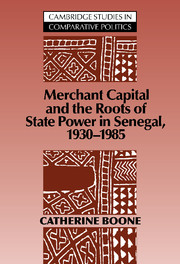Book contents
- Frontmatter
- Contents
- List of tables and figure
- Preface and acknowledgments
- Introduction
- 1 Capital and contingencies of postcolonial politics
- 2 The colonial market
- 3 Consolidation of a regime: Neocolonialism in the 1960s
- 4 Growth of Senegal's textile industry, 1960–1975
- 5 Reappropriation of the state: The 1970s
- 6 Demise of the Dakar textile industry
- Conclusion: States, capital, and capitalist states
- Appendix: Exchange rates
- References
- Index
1 - Capital and contingencies of postcolonial politics
Published online by Cambridge University Press: 13 October 2009
- Frontmatter
- Contents
- List of tables and figure
- Preface and acknowledgments
- Introduction
- 1 Capital and contingencies of postcolonial politics
- 2 The colonial market
- 3 Consolidation of a regime: Neocolonialism in the 1960s
- 4 Growth of Senegal's textile industry, 1960–1975
- 5 Reappropriation of the state: The 1970s
- 6 Demise of the Dakar textile industry
- Conclusion: States, capital, and capitalist states
- Appendix: Exchange rates
- References
- Index
Summary
In short, property rights were politicized rather than privatized in many parts of colonial and postcolonial Africa, and strategies of accumulation tended to be directed towards building up power over resources rather than increasing their productivity.
Sara Berry 1984:92Colonialism bore stark testimony to Europeans' readiness to use state power, through military force if need be, to gain in sub-Saharan Africa what the “invisible hand” of the market had not delivered. The force of armies, tax collectors, and colonial police was used to capture labor, commodities, and markets. Economic access and power so secured were maintained in the same way. The state played a central role in defining terms of exchange and creating discriminatory patterns of access to economic resources, just as it has since independence. Metropolitan and local colonial administrations worked to implant and maintain monopolies, broadly defined as “more or less exclusive control over resources or markets and the prevention of free competition,” to shelter colonial interests from international and African competition. They were decidedly nonliberal in both theory and practice. Where they could, colonial regimes imposed or reinforced political controls over factors of production or access to them, over opportunities for private capital accumulation, and over internal markets.
- Type
- Chapter
- Information
- Merchant Capital and the Roots of State Power in Senegal1930–1985, pp. 14 - 30Publisher: Cambridge University PressPrint publication year: 1992



